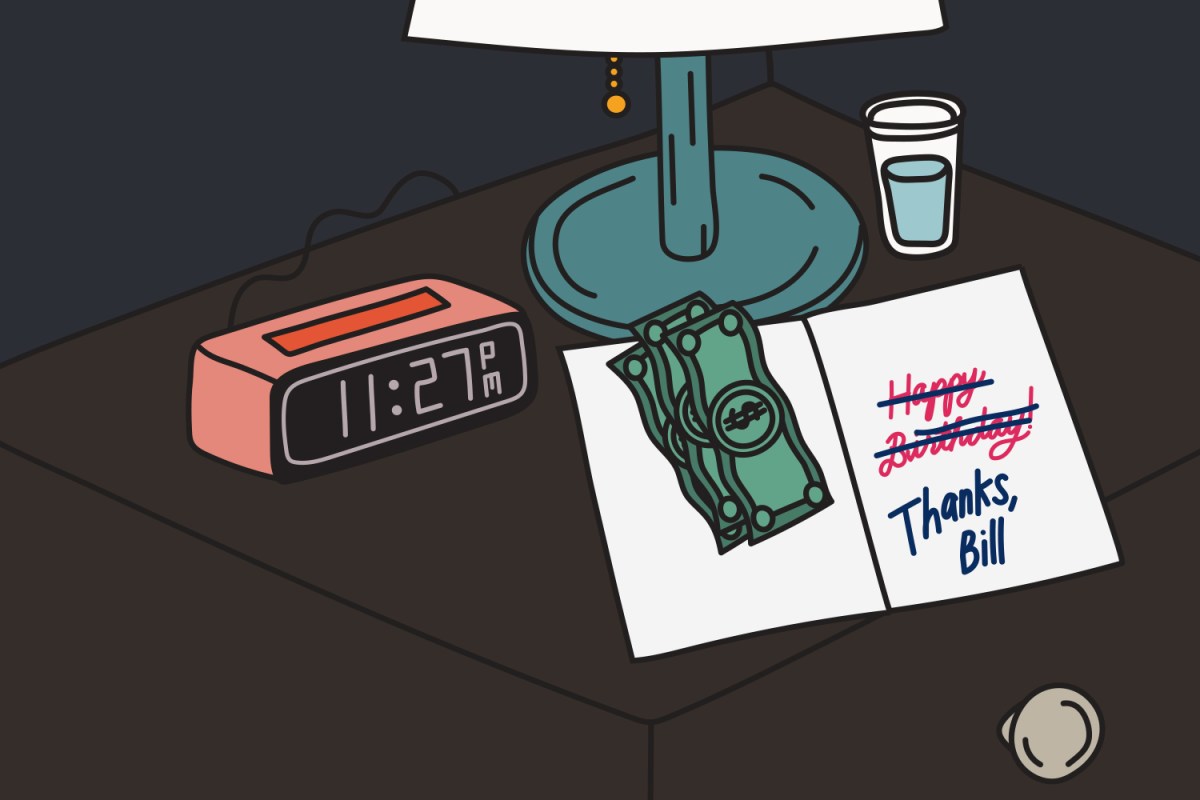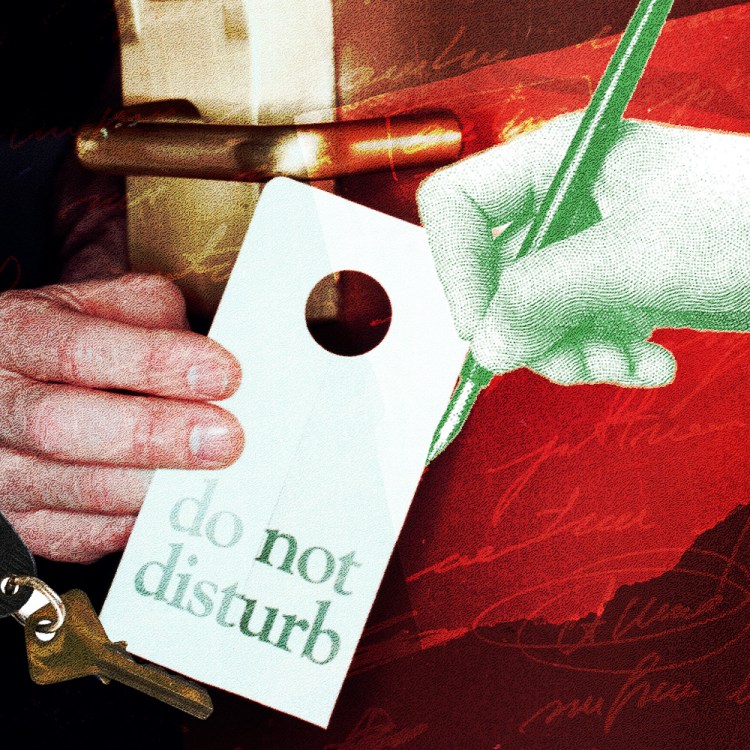You know the trope: A down-on-his-luck man is sitting at a bar when he’s approached by an unbelievably gorgeous woman only to find out, wait for it, she’s a sex worker. That’s it. That’s the joke.
The tired schtick — as seen in shows like The Big Bang Theory, The Mindy Project and The Girlfriend’s Guide to Divorce (the latter two with inverted gender roles) — hinges on the pervasive misconception that sex work is an inherently shameful and humiliating business patronized by sad, pitiful loners who can’t get laid on their own.
This idea isn’t limited to sitcom scripts. We see it in real life when we mock public figures who “get caught” paying for the services of sex workers (think Robert Kraft, Hugh Grant or Lamar Odom), and it’s the reason many men — including, as Sessi Kuwabara Blanchard recently pointed out for MEL magazine, many supposedly “woke” ones who vocally support sex work — are reluctant to pay for sex, or at least to admit to it.
Of course, as two of the above examples from TV suggest, it isn’t just men who pay for sex, although certain patriarchal constructs that equate sexual desirability with masculinity tend to render them more vulnerable to these misconceptions. As one sex worker told Blanchard, there exists a mentality among many heterosexual men that one should be able to “get pussy without paying for it.”
To these men, the messaging is clear: paying for sex is an act of necessity and desperation undertaken by suckers who can’t get it any other way. Not paying for sex, then, becomes a point of pride. To not pay for sex, according to the various men who have proudly informed me they never have when the topic of sex work comes up, means they’ve never had to.
As you might expect, this problematic line of thinking only increases the stigma surrounding sex work for both providers and the many consumers, of all genders, who seek out their services.
“It’s truly impossible to get into the head of everyone who hires for companionship,” says Lee Ann Jennings, CEO of escort directory Slixa.com. “The reality is that there are as many reasons folks seek out paid companionship as there are people seeking it.”
And while it’s impossible to distill any one underlying motivation from the myriad complex reasons any given individual may choose to pay for sex at any given time, one thing remains clear: “The myth of a desperate client paying because they ‘have to’ is as much a fiction as any other neatly boxed-up portrayal,” Jennings tells InsideHook. “It’s rooted in antiquated ideas about sexuality and gender roles and ultimately in misogyny and toxic masculinity.”
The professional touch
The misconception that those who pay for sex do so because they “have to” almost makes sense for a brief moment if you’re willing to entertain a line of reasoning that begs the question, “Why would anyone pay for something they can get for free?” In other words, to revise a certain misogynistic metaphor meant to describe a distinct yet similarly problematic attitude toward sexuality, why pay for the milk if you can get it for free?
That is, of course, until you remember that people pay for things they could get for free all the time. Yes, you could probably cut your own hair at home, but many people prefer to have a professional take care of it. Just like choosing to enjoy a nice dinner at a restaurant doesn’t mean you’re incapable of cooking your own meal at home, and sending a shirt to the dry cleaner doesn’t mean you don’t know how to operate a washing machine.
Sex work is a professional service like any other, and the reasons a customer may choose to pay for that service instead of going the DIY route vary greatly. Often, people who choose to hire a professional do so because they want high-quality service from a trained expert in that field. Sex work is no different.
“People see us as the professionals,” says Allissa, a legal sex worker at Sheri’s Ranch in Pahrump, Nevada. “We definitely have more experience, and experience is the best teacher, of course,” she tells InsideHook, adding that the “controlled environment” of a brothel adds a level of professionalism that appeals to many clients.
That professional environment also promises a certain standard of sexual safety. “There are men who pay for sex because they enjoy professional sex workers who test frequently and are likely to be safer than a stranger,” says courtesan, performer and model Sarah Vandella.
“We do get tested, and we are very safe,” echoes Allissa. “It’s our number-one priority.”
And for those who are interested in the variety of experiences that fall under the “kink” umbrella, the need for professional levels of safety often goes beyond regular testing and protection. In the world of BDSM, engaging in certain sex acts without the guidance of a trained and knowledgeable professional can be dangerous, especially for beginners.
“I like to say that BDSM is the ‘advanced math’ of relationships,” says intimacy and relationship coach Miss Couple. “You need to master more basic relationship skills like negotiation and consent, and communication and interpretation of verbal and non-verbal cues in order to successfully and safely engage in healthy BDSM play,” she tells InsideHook, adding that a knowledgeable, trauma-informed approach is also instrumental in navigating the complex physiological and psychological responses BDSM play can trigger. “Because these skills take a great deal of study to develop, hiring a professional can be a wonderful option for people who want some guidance as they begin to explore,” says Miss Couple.
Choose your own level of emotional intimacy
For many sex-work patrons, the appeal of professional sex isn’t just about safety and quality of service, but in the mere exchange of money itself. Reframing sexual intimacy in the context of a business transaction can establish certain boundaries and create a desired dynamic and environment — though, as always, the motivations behind that desire vary from case to case.
For some clients, it might mean the emotional freedom of a true no-strings-attached experience. “They understand that they’re paying for a service,” says Vandella. “The service is mutual, the service is agreed upon, the service is respected. Once the service is over, the parties separate, which makes it a business transaction. No strings attached, no emotions, no drama.”
Many of these clients simply aren’t interested in a traditional relationship and don’t want to risk the emotional complications that notoriously tend to disrupt even the best-intentioned “casual” arrangements.
“There’s a lot of people that don’t have time for relationships and dating, and they don’t want the hassle of it,” says Allissa. “It’s easier just to have the transaction over with and not have to worry about the emotional attachment.”
But the no-strings appeal isn’t just for the busy and commitment-averse. Allissa adds that many clients seeking the emotional distance sex work can provide do so out of a desire to protect another intimate relationship, whether it’s couples who want to explore group sex together in a jealousy-free environment or widow(er)s who are ready to move on from their spouses physically but not emotionally.
On the other hand, for every person who turns to sex work to avoid certain kinds of intimacy, there’s another seeking the exact opposite of the experience.
“Many people are seeking companionship, understanding and caretaking in a non-judgmental environment,” says Miss Couple. “Many folks feel more comfortable engaging in intimacy when there are professional boundaries in place, and therefore seek out a sex worker rather than a hookup on Tinder.”
As both Allissa and Miss Couple note, the bond between a sex worker and a client can include a mental and emotional dynamic some in the industry compare to that between a therapist and client.
“I feel like I’m a sex therapist at times, too,” says Allissa, adding that her clients are often seeking “companionship and therapy” in addition to — or sometimes in lieu of — strictly sexual services.
Indeed, says Miss Couple, “Many sex workers are masters of communication, empathy and caretaking,” adding that while it is not commonly known outside of the industry, “Sex workers are healers. They provide not only sexual, but a great deal of emotional and mental support to their clients.” The relationship between client and provider, she says, “is very meaningful to those who engage in it, and extends far beyond the realm of sexuality, into the realm of wellness and well-being.”
Interestingly, Jennings at Slixa makes a different, yet probably not unrelated, connection between sex work and therapy, comparing the question of why people pay for the services of sex workers to the same question of therapists.
“If you reframed the concept entirely and asked, ‘What’s the real reason people go to therapy?’ you’d be instantly confronted with the reality that those reasons are completely individuated, and the desired outcomes just as diverse,” says Jennings. “There’s no way to point a finger toward a single ‘real’ motivating factor.”
Fortunately, there’s also no reason to. Sex work, as they say, is work. It’s just a service like any other, and there’s no right or wrong reason to seek it out, as long as it’s done with the same respect owed any other provider of any other service.
A luxury experience
While some people pay for sex in order to fulfill complex emotional or physical needs that traditional sexual dynamics can’t, pleny of others are just there for a good time. Allissa says Sheri’s Ranch has hosted many a bachelor party and 21st birthday, and is often considered “part of the Vegas experience” for tourists.
“People come here to celebrate or treat themselves,” says Allissa. For those people, paying for sex is a luxury experience — a fun night out not unlike dropping money on a five-course dinner or a table at a nightclub.
One of the puzzling things about the stigma against paying for sex is that under most other circumstances, we tend to valorize those who have the disposable income to spend on things the rest of us can’t afford. Shelling out cash for luxury goods and services is often seen as a sign of status, so why should we think any differently just because the service being provided is sex?
As it turns out, the idea of sex as a luxury commodity is yet another strike against paying for it, at least to some detractors. In the case of MEL’s “woke boys who won’t pay for sex,” the fear seems to be that paying for sex is demeaning not necessarily to the customer, but to the provider. Or, as Blanchard puts it, “These guys support decriminalizing sex work because they’re feminists, but they also seem to not pay for sex because they’re feminists.”
This line of thinking holds that paying for sex objectifies providers, an idea that in turn hinges on harmful, dated, ad hominem attitudes about women and sex. It supposes that a sex worker is selling “herself,” and that her state of being is inherently tied to her sexuality. In reality, she is merely providing a service in exchange for remuneration. That’s it.
The weird thing about the whole “getting the milk for free” idea is that milk — actual milk — is rarely free, and we don’t expect it to be. Outside of metaphors, no one questions anyone’s reasons for buying milk, or argues that dairy farmers are being treated like objects or robbed of their agency. Of course you pay for milk; why wouldn’t you?
Sex, similarly, has always been for sale. So: Why wouldn’t you pay for it?
The Charge will help you move better, think clearer and stay in the game longer. Subscribe to our wellness newsletter today.
























